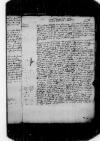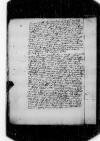⌊⌋ 1527-04-22⌊22 Aprilis1527-04-22⌋ et ⌊⌋ 1527-05-06⌊6 huius1527-05-06⌋ in compendio, quae id temporis se offerebant; ad praesens iterum cogor esse brevior, quam velim; solent enim nobis postae abiturae, cum iam sunt in praecinctu, notificari. Totis his diebus in negotio adohae per me laboratum est et tum demum post mensem responsum obtinui sine responso. Sic hic solent facere, ut prius scripsi, cum nihil volunt facere vel cum aliquid aliud exspectant.
Scripsi in ⌊⌋, quod decreveram convenire ea in re iterum ⌊maiestatem caesaream⌋, quae venatum ire debuerat, idque frustra temptavi, quandoquidem maiestas sua praeter omnem spem summo mane clandestine se nobis subtraxit et paulo ante precibus ac gemitibus ⌊imperatricis⌋ illectus rediit. Unde cum ⌊maiestatem suam⌋ accedere statuissem, prius cum domino ⌊Sigismundo Loffredo⌋ conveni, qui mihi dixit, se iam istius negotii habere resolutionem iamque se fuisse apud caesarem, qui sibi cum aliis de ⌊consilio Aragoniae⌋ commisisset res iustitiae expedire; sed de rebus gratiae absente ⌊cancellario⌋ nondum se ordinem fecisse, qua de re in iis, quae iustitiam spectarent, ratione istius adohae iam factam esse provisionem ⌊Granatae⌋, quam ego ad ⌊Scipionem de Summa⌋ misissem, quod si adhuc talem habere velim, non posset mihi negari. In rebus vero gratiae nihil possent disponere; ob idque mihi consuluit, ut usque ad reditum ⌊cancellarii⌋, vel donec alius fieret cancellarius, exspectarem. Super hoc responso boni hic viri ultra unius mensis decursum laborarunt, quo hoc tempus, quod exspectant, redimerent. Addidit etiam dominus ⌊Sigismundus Loffredus⌋, quod scripsisset fratri suo uterino ⌊Scipioni de Summa⌋, ut me deinceps instrueret, quid hic de gratia aut de iustitia petere deberem, quasi hoc mihi foret ignotum. Ad ea respondi, quod hanc moram, quae fieret, satis bene intellegerem, cur fieret, quodque non fuisset necessaria, cum ex supplicatione mea liquido constaret, quid de iustitia aut quid de gratia etc. dicunt, quodque desuper tam longa consultatio fuisset supervacanea, nam si visa fuisset nihil posse de iustitia, remitti debuit et non tam diu detineri; data etiam fuisset per me in manus ⌊caesaris⌋, qui a iustitia simul et de gratia potuisset disponere, videreturque mihi supplicatio mea plus iustitiam, quam gratiam exigere. Nam Serenissima Maiestas Vestra ad omnia ea post mortem illustrissimae dominae ⌊matris⌋ suae est admissa per investituram ⌊caesaris⌋, quae illa de iure et consuetudine umquam tenuit et possedit et in omnibus debitis et consuetis legitime successit; quocirca haec consuetudo non solvendi adoham, quamdiu in ⌊regno Neapolitano⌋ est observata et in quam Maiestas Vestra Serenissima
omni iure successit, plus ex iustitia quam ex gratia dependeret, fueruntque plurima alia inter nos amicabili tamen modo dicta, quibus ⌊ille⌋ aliquando non potuit reluctari dicens se ea facere, quod sibi pro suo officio conveniret. Ad id vero, quod mihi consuluit, ut cum ista adohae exemptione ⌊cancellarii⌋ adventum, aut donec alius cancellarius fieret, praestolarer, non esse integrum rebus Maiestatis Vestrae Serenissimae respondi et moram eam periculosam, quippe cum fiscus ⌊caesaris⌋ ibidem in regno fortassis iam contra officiales Maiestatis Vestrae ea in re processerit. Itaque me iterum ⌊caesarem⌋ accessurum dixi, ad quod ille subintulit me hoc posse facere et experiri; si forsan alteri cuipiam hoc negotium caesar committeret, se semper id facturum pro Maiestate Vestra Serenissima, quod posset et quod sibi liceret. Sic inter nos fuit haec res habita.Unde plane Maiestas Vestra cognoscit, quod de industria morae nectentur, quo negotium ibidem in regno interim transigatur aut ut inde responsum habeant, quid desuper facere debeant. Hucusque igitur nihil expedire potui.
Postero feci aliam supplicationem et accessi ⌊caesarem⌋ in prandio conquerebarque, quomodo mihi toto hoc mense transacto impositum fuisset et quomodo mihi dominus ⌊Sigismundus Loffredus⌋ respondisset, quod super supplicatione mea nihil aliud fieri posset, quam id, de quo ⌊Granatae⌋ fuisset provisum, et quod non esset de suo foro, cum illa, quae ego peterem, plus viderentur exigere gratiam quam iustitiam, cuius exsecutio sibi cum aliis consiliariis esset commissa et se non posse disponere de gratia; exposuique suae maiestati omnia nudis verbis, quam in supplicatione descripseram, exaggerando id, quod ea consuetudo, in qua a principibus regii originis non exigitur adoha, plus de iustitia, quam de gratia ad Maiestatem Vestram spectaret, cum in eam per investituram pleno iure Maiestas Vestra Serenissima successisset et illustrissima olim praeclarissimae memoriae ⌊mater⌋ Maiestatis Vestrae in eadem consuetudine per ⌊regem catholicum⌋, etiam per ⌊maiestatem suam⌋, quamdiu vixit, semper fuit conservata. Rogavique, ut liceret Maiestati Vestrae iis iuribus et consuetudinibus uti, quibus illustrissima olim ⌊mater⌋ Maiestatis Vestrae usque ad extremos vitae dies usa libere fuerat. Cum aliis verbis ac sententiis, quae pro re expedire videbantur, ⌊maiestas sua caesarea⌋ serena fronte a me supplicationem suscepit et respondit, quod velit in hac causa melius informari et omnia facere, quae essent possibilia, mihique paulo post desuper respondere. Haec omnia 1527-05-18⌊Sabbato, hoc est pridie1527-05-18⌋ facta sunt. 1527-05-18⌊Eodem die1527-05-18⌋ venit ad me in deversorium meum dominus ⌊Sigismundus Loffredus⌋ et quaesivit a me, si allocutus fuissem ⌊caesarem⌋, cui omnia dixi, quae acta erant. Quaesivit iterum diligenter, quo vultu mihi ⌊caesar⌋ respondisset, cum dicerem eum iis rebus noluisse intendere, utpote quae videbantur gratiam et non iustitiam petere; et hoc illi declaravi sicque a me subinde decessit. Quid sibi haec quaestio velit, adhuc non possum divinare, donec a ⌊caesare⌋ habuero responsum, pro quo, si fieri posset, cras sollicitabo et
posse quae hinc nascentur, cum primis Maiestati Vestrae Serenissimae perscribam, quam ista latere nolui, ut saltem perspiceret et perpenderet, quomodo hic tractatur et quod per me nihil omittitur, quantum se meus extendit intellectus, quod facto opus esse cognosco, quo et negotiis Maiestatis Vestrae Serenissimae bene inserviatur et ego tandem ex hoc ergastulo semel liberari possim.
Iniunxerat mihi in novissimis suis Maiestas Vestra Serenissima, ut quam celerrime litteras super exemptione adohae Maiestati Vestrae Serenissimae transmitterem, persuasit enim sibi, cum iustum est id, quod petit, quod facile hic posset impetrari. Iam videt Maiestas Vestra Serenissima, quomodo semper inveniuntur modi, quibus postulata Maiestatis Vestrae impediuntur nitunturque eam a iustitia ad gratiam traducere, de qua parum sperare possimus, cum ipsa nobis aequitate denegatur. Voluit etiam, ut ea hic approbarentur, quae a Maiestate Vestra per scripturam probari non possent. Si hunc articulum supplicationi meae inseruissem, ut a iuris peritis edoctus sum, possent sic hic interpretari, quod Maiestas Vestra Serenissima diceret, totum ⌊regnum Neapolitanum⌋ ad se spectare. Sic nodum hic quaerunt in scirpo; cumque factus sum Hispanus, ut scribit Maiestas Vestra Serenissima, et iam tum demum et mores et homines cognoscere incipio, caute cum illis mihi agendum est. Ego hoc unum affirmare ausim, quod si Maiestas Vestra Serenissima hic neminem habuisset et per litteras cum ⌊maiestate caesarea⌋ egisset, iam pridem ⌊statu suo Barensi⌋ privata esset et si consensum matrimonii ante ⌊viceregis⌋ adventum hic non obtinuissem, iam vix impetrari posset; invenissent aliam practicam. Ea in re nihil mihi ascribo neque arrogo, quandoquidem per alium quempiam omnia commodius expediri potuissent et minori fortassis labore ac impensis, cum ego certe multum laboraverim et impenderim. Sed hoc ea propter scribo, ut Maiestas Vestra Serenissima clarius perspiciat, in quibus difficultatibus negotia Maiestatis Vestrae Serenissimae hactenus sunt versata, quarum adhuc finem non video. Det Deus illis finem, qui eas faciunt.
De castellano Barensi misi cum novissimis Maiestati Vestrae Serenissimae exemplum provisionum, cumque in dominum ⌊Calamarium de Summa⌋ Maiestas Vestra iam consenserit, ut vidi excerpta ex litteris Maiestatis Vestrae per dominum ⌊Scipionem de Summa⌋ ad me missa, non arbitror esse necessarium, ut ad ⌊Alarconem⌋ seu ad illius locum tenentem litterae ⌊caesaris⌋ more Hispano scribantur, quibus illi semel, bis, ter mandetur, ut castro cedat; iam ille dicto erit audiens, ut mihi dominus ⌊Sigismundus Loffredus⌋ dixit, quamprimum ⌊vicerex⌋ mandaverit. Nihil itaque iam est reliquum, cum Maiestas Vestra Serenissima castellanum hunc habet, quod me hic ulterius detinere deberet; terminus peremptorius seu diffamatorius ⌊Neapoli⌋ potest transigi. Quapropter si cum bona gratia Maiestatis Vestrae Serenissimae fieri potest, illi quam humillime supplico, dignetur me tandem in hoc quarto anno revocare ac reditus mei clementem habere rationem, quam una mecum gratiae atque incomparabili erga omnes aequitati Maiestatis Vestrae Serenissimae suppliciter commendo.


